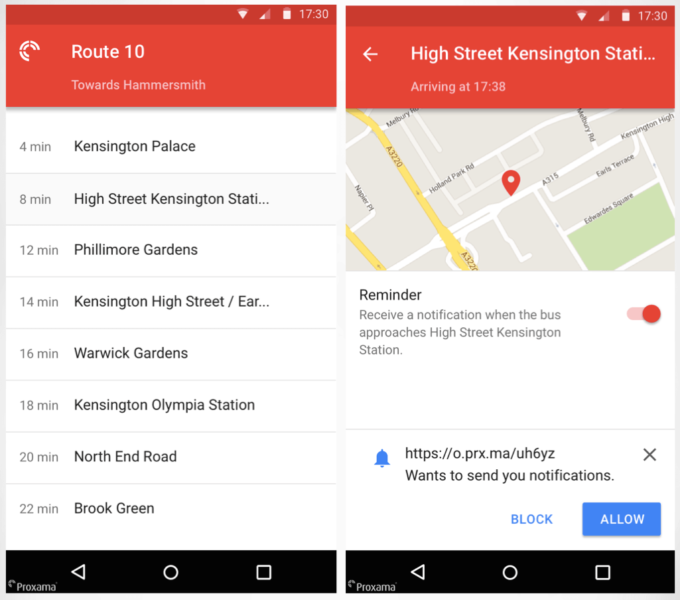London buses test out the first consumer experience of the Physical Web
The MyStop project transmits a URL to all nearby bus passengers with a supporting browser, leading to a browser-based web app containing the latest bus route info.
The Google-backed Physical Web is now operating in the physical world.
UK-based mobile commerce provider Proxama, in partnership with out-of-home advertising firm Exterion Media, launched this month in London what they describe as “the world’s first deployment of a Physical Web consumer engagement experience.”
Called MyStop, the project delivers up-to-date bus information and notifications to passengers and eventually will include related advertising.
A hundred beacons are deployed across the same number of buses, one near the front of each equipped bus. The beacons support the full Eddystone protocol from Google, which means that they can short-range broadcast a URL to any supported browser via Bluetooth.
Jon Worley, CEO of Proxama’s promixity marketing division, told me that the Bluetooth range of transmission is sufficient to cover an entire bus. Any passenger whose iPhone or Android mobile device has a supporting Chrome browser version — the only Eddystone-supporting browser so far — can receive a notification that there are Physical Web beacons nearby. The Firefox, Opera and new Microsoft Edge browsers are expected to also support the full Eddystone protocol.
When the user opens the notification, she sees one or more URLs:
Clicking on the bus URL brings up a progressive web app in the browser, which is being transmitted to the passenger via cellular data like 3G/4G, or via an available WiFi hotspot.
A progressive web app is a browser-based experience that resembles the speed and interactivity of an app. The URL could also lead to a regular web page.
In the case of the MyStop project, the progressive web app shows real-time route updates, obtained via an open API from the London agency governing public transportation.
If you so choose, you can receive a notification to the web app or the phone’s locked screen when you’re within a minute of your upcoming bus stop. You can also see where the bus is on a map of London.
The browser is the biggest advantage of what Google has called the Physical Web — users aren’t required to download an app to read the beacon. The name derives from the idea that a user can thus explore the surrounding Eddystone beacon-equipped physical world.
With regular beacons, you need to have installed a supported app that will read their location IDs. Sometimes that means one app for one retailer’s set of beacons, although there are apps that support multiple retailers. When received, the location ID is then sent by the app to a marketer’s server, which returns via 3G/4G or WiFi whatever the app is designed for, such as a coupon.
With Eddystone, you get a URL in the browser, which allows you to receive or interact with any kind of experience offered by a web browser.
Contributing authors are invited to create content for MarTech and are chosen for their expertise and contribution to the search community. Our contributors work under the oversight of the editorial staff and contributions are checked for quality and relevance to our readers. MarTech is owned by Semrush. Contributor was not asked to make any direct or indirect mentions of Semrush. The opinions they express are their own.
Related stories


